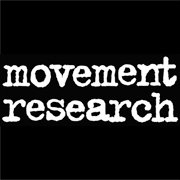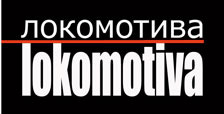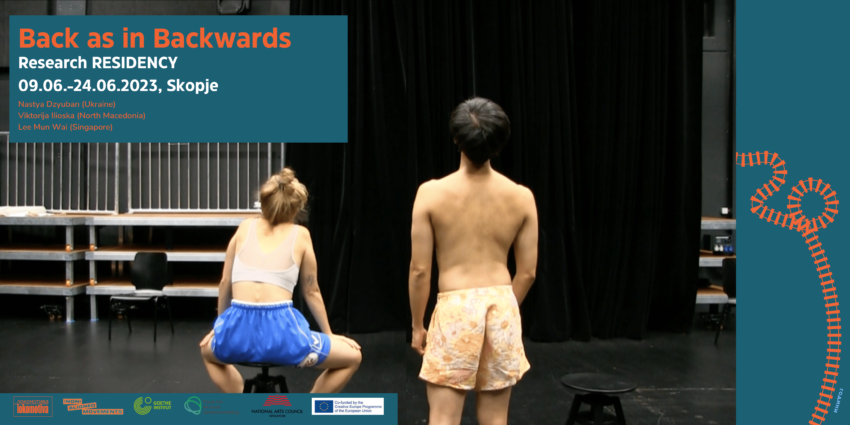Nastya Dzyuban (Ukraine) together with her colleagues and collaborators Viktorija Ilioska (North Macedonia) and Lee Mun Wai (Singapore)
“What difference does it make what we are oriented toward?”, asks Sarah Ahmed. In her perspective, queer phenomenology might be the way to be facing towards the back. But what does it mean to be oriented backwards? And more generally, how do we even get oriented?
Back is an intriguing side of the body, though it is usually underrepresented and marginalised. It is resisting identification, recognition, it is lacking a face. It is a mystery that can nevertheless be revealed. Progress is meant to move forwards, not backwards. The general political directionality, however, seems to be moving backwards, which last year, has been revealed especially sharply in the context of my home country, Ukraine. The whole Europe is watching at what is happening on the frontline of the war, following our brave defenders at the front, holding the line against the invaders. However, how would it have been possible without a strong home front, the rear? While the whole attention is directed forwards, straight ahead, the backspace can offer a subversive strategy of empowerment, political resistance, support, sometimes even queering the notion of progress. In the context of a moving body, or a body seen from behind, back proposes a lot of potential in its anonymity and promises a turn-around of some sort. Turning around might involve both: recognition and pleasant surprise as well as regression, degradation, and mistake — a “strange encounter.” Stranger is not only a figure that transmits strangeness, it is at the same time “painfully familiar”. We recognise someone as a stranger, most often these would be foreigners, immigrants, refugees. Having experience of migration oneself, feeling of being strange and foreign is an all too familiar sensation. And when one is strange to the surroundings, one looks for a way to be oriented. One is oriented in two directions at the same time, “toward a home that has been lost, and to a place that is not yet home”. Orientation, as a purely phenomenological question, is worldly, situated, and embodied, as it is tied to the surrounding objects. With that, orienting ourselves anew can help us to see the world in a new way and expand our understanding of ourselves and others. In the research residency under the title “Back as in Backwards” Nastya Dzyuban together with her colleagues and collaborators Viktorija Ilioska and Lee Mun Wai will investigate specific perspectives of queer phenomenology, particularly the gaze directed from behind, the notion of (migrant) orientation, and the figure of a stranger, delving into the choreographic exploration on the backside of the body, backwards movement and the specificity of meanings, movements and images that this queer perspective produces.
Biographies of the participating artists:
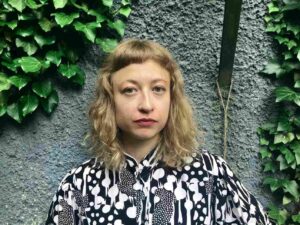 Nastya Dzyuban works with dance and choreography. She was born in Kyiv, Ukraine and currently resides in Giessen, Germany. Since 2015, Nastya has been developing her artistic practice and creating performative works, mostly in collaboration with close friends and colleagues. She is interested in intersections of the dispositives of theatre and choreography, as well as in notions such as potentiality, migration, the notion of the common. Her works have been shown at festivals in Kiev, Frankfurt, Bochum and Mannheim. In 2021 Nastya became a fellow of danceWEB under the mentorship of Anne Juren and Frédéric Gies. Nastya graduated MA program “Choreography and Performance” in Giessen and currently works as a freelance choreographer, dancer and performer in Gießen and Frankfurt am Main.
Nastya Dzyuban works with dance and choreography. She was born in Kyiv, Ukraine and currently resides in Giessen, Germany. Since 2015, Nastya has been developing her artistic practice and creating performative works, mostly in collaboration with close friends and colleagues. She is interested in intersections of the dispositives of theatre and choreography, as well as in notions such as potentiality, migration, the notion of the common. Her works have been shown at festivals in Kiev, Frankfurt, Bochum and Mannheim. In 2021 Nastya became a fellow of danceWEB under the mentorship of Anne Juren and Frédéric Gies. Nastya graduated MA program “Choreography and Performance” in Giessen and currently works as a freelance choreographer, dancer and performer in Gießen and Frankfurt am Main.
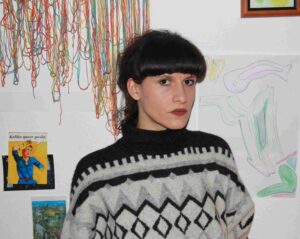 Viktorija Ilioska is a Macedonian choreographer and performer living and working between Northern Macedonia and Germany. For over 10 years she has been actively working on programs to promote and develop contemporary dance, both in collaboration with institutions and strengthening the independent scene. Since 2010 she has been a member of Nomad Dance Academy, creating connections and collaborations in the local and national context of the Balkan region. Viktorija holds a Master’s degree in Choreography and Performance from the Institute of Applied Theatre Studies at Justus Liebig University. She plays with different forms of provocation and often explores notions of labor, identity, and female representation in public space in her work.
Viktorija Ilioska is a Macedonian choreographer and performer living and working between Northern Macedonia and Germany. For over 10 years she has been actively working on programs to promote and develop contemporary dance, both in collaboration with institutions and strengthening the independent scene. Since 2010 she has been a member of Nomad Dance Academy, creating connections and collaborations in the local and national context of the Balkan region. Viktorija holds a Master’s degree in Choreography and Performance from the Institute of Applied Theatre Studies at Justus Liebig University. She plays with different forms of provocation and often explores notions of labor, identity, and female representation in public space in her work.
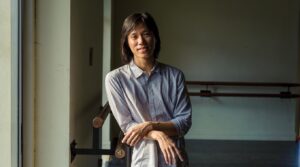 Lee Mun Wai is a choreographer and dancer who works freelance between his two residences – Berlin and Singapore. He graduated from the Master of Choreography and Performance (MA CuP) program at the Institute of Applied Theatre Studies in Giessen, Germany in July 2021. His current dance and choreographic practice insists on a relational permeability between himself and his environment. Recent projects Mun Wai has been involved in include On Display (2021), his own solo premiered at Künstlerhaus Mousonturm, Frankfurt, as part of the Tanzfestival Rhein Main; Oracle and Sacrifice In The Woods (2021) & Thyestes Brüder! Kapital (2019) by German choreographer/director Claudia Bosse; Mark (2017) by Singaporean choreographer Daniel Kok; and There Is Speficifisfety (2018), a collaboration with Malaysian choreographer/dancer Lee Ren Xin.
Lee Mun Wai is a choreographer and dancer who works freelance between his two residences – Berlin and Singapore. He graduated from the Master of Choreography and Performance (MA CuP) program at the Institute of Applied Theatre Studies in Giessen, Germany in July 2021. His current dance and choreographic practice insists on a relational permeability between himself and his environment. Recent projects Mun Wai has been involved in include On Display (2021), his own solo premiered at Künstlerhaus Mousonturm, Frankfurt, as part of the Tanzfestival Rhein Main; Oracle and Sacrifice In The Woods (2021) & Thyestes Brüder! Kapital (2019) by German choreographer/director Claudia Bosse; Mark (2017) by Singaporean choreographer Daniel Kok; and There Is Speficifisfety (2018), a collaboration with Malaysian choreographer/dancer Lee Ren Xin.
Residency is organized in collaboration with Movement Research, and Dance Department, Film Academy at UGD and as part of Non Aligned Movement project.
It is supported by Trust for Mutual Understanding, National Arts Council of Singapore, Goethe Institute and co-funded by the Creative Programme of the European Union.
